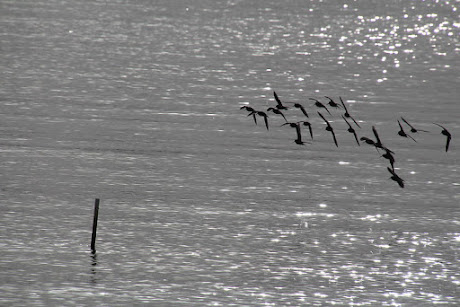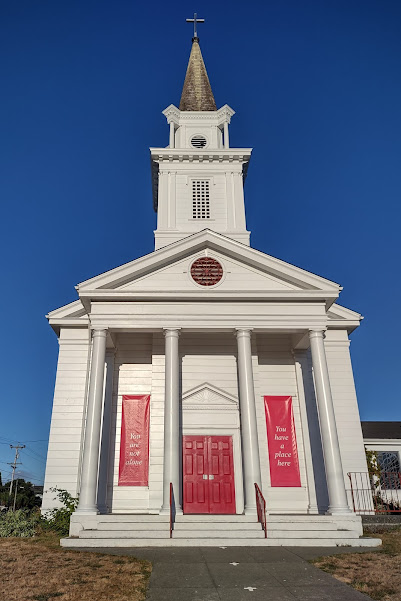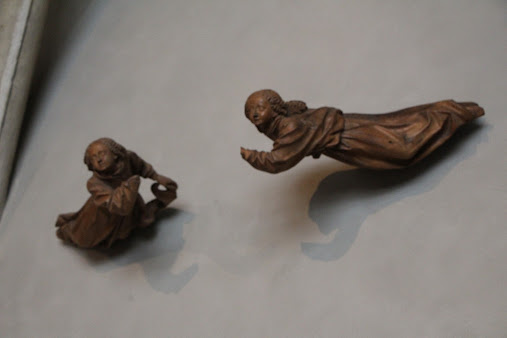Lisa Hirsch's Classical Music Blog.
The iron tongue of midnight hath told twelve. Lovers, to bed; 'tis almost fairy time.
Berce mollement sur ton sein sublime
Ô puissante mer, l’enfant de Dindyme!
Friday, December 30, 2022
Thursday, December 29, 2022
2022
I haven't looked back in any systematic way at performances I saw in 2022, so this will be a little on the random side. Note that these lists aren't in any particular order.
On the good side....
- John Adams returned to excellent operatic form with Antony and Cleopatra, thanks to his use of Shakespeare, Virgil, and the like for texts, and the involvement of the opera's dramaturg and director in creating the libretto. I also loved his most recent piano concert, Must the Devil Have All the Good Tunes?, superbly performed at SFS by Esa-Pekka Salonen and Vikingur Olafsson.
- Le Nozze di Figaro at Opera San José, set in 19th c. colonial India, superbly staged, beautifully sung, and mostly well conducted.
- Otello at Livermore Valley Opera: this was the single most convincing performance of the work that I have seen, owing to outstanding singers and rip-roaring conducting.
- Ariane and Bluebeard and Coraline at West Edge Opera. I loved both these operas, and saw Ariane, a very great rarity, twice.
- Dialogues of the Carmelites at SFO. Superbly sung all around, in a beautiful, and beautifully directed, production by Olivier Py. Media round-up.
- Orpheus and Eurydice (Gluck) at SFO. A remarkably beautiful production with excellent singing and conducting. It looked and sounded better in the opera house than in the livestream.
- La Belle et la Bête (Glass) at Opéra Parallèle.
- Julia Bullock's recital, History's Persistent Voice, all new and recent works by Black women. Superb singing, gorgeous music.
- Nikola Printz's recital, which traversed an enormous musical and emotional range. Looking forward to hearing Printz as an Adler Fellow!
- Mirga G-T and the City of Birmingham Symphony Orchestra, which I never wrote up. A superb orchestra superbly conducted.
- Almost everything conducted by Esa-Pekka Salonen at SFS.
- Nathalie Stutzmann at SFS.
- Simone Young at SFS (I think she was in 2022...)
- No Love Allowed (more widely, Das Lebesverbot) at Pocket Opera.
- Reiner Eudakis, the new principal cello at SFS.
- Danny Elfman's new cello concerto at SFS (but there were boffo performances of Tchaikovsky and Stravinsky on the same program, thanks to MTT). If you want to hear Elfman at his considerable best, the Netflix series Wednesday has a fantastic soundtrack.
- Don Giovanni at SFO. The singing was first-class, the staging idea had promise that wasn't realized.
- Eugene Onegin at SFO, marred by poor casting of the title role and Tatyana.
- Mason Bates's piano concerto at San Francisco Symphony, which I did not like.
- Lahav Shani and the Israel Philharmonic. Too loud and overbearing in general; Mahler's first symphony was incoherent and generally sounded the way people who don't get Mahler think he always sounds. I thought that Paul Ben-Haim's first was too loud and incoherent, then realized that the problem might have been the performance, not the work. Oh, well!
- The number of open seats at SFS. They've now held their second round of auditions for principal flute, so watch who's playing with Salonen is in town.
- The number of open seats in the SFO Orchestra.
Young Composers and Performers
You'll want to read a few other articles before you read what I have to say about this; I'm also taking this opportunity to ride a related hobby horse of mine.
- Joshua Kosman, SF Chron, This composer is about to conduct her own opera for the first time. She’s 17 years old.
- Alex Ross, The New Yorker, Looking Past the Celebrity Conductor (This appeared in my feed reader as "Stick Figures".)
- Joshua Kosman, SF Chron, Young musicians keep showing up on concert stages. It’s not clear they’re ready.
Friday, December 23, 2022
Wednesday, December 21, 2022
SFO at SFO
My article on the San Francisco Opera archive mentioned an exhibit of archival material at the San Francisco Airport Museum. It's in the Harvey Milk Terminal 1, Departures Level 2, Gallery 1D, through Aug. 13, 2023. Because I don't know whether I'll be at the airport between now and then - it depends on whether I go to Scotland in the spring, which in turn depends on work and COVID - I figured I probably would not get to see it. Now there's a press release from San Francisco Opera, and it turns out that there is a way to see it without flying: you can make an appointment by emailing curator@flysfo.com.
There's some very cool stuff at this exhibit!
San Francisco, CA (December 20, 2022) — SFO Museum at San Francisco International Airport recently unveiled a new exhibition in connection with San Francisco Opera’s centennial titled San Francisco Opera: A Centennial Celebration. The curated installation in the Harvey Milk Terminal 1 (located post-security in Departures Level 2) showcases the Company’s first century and the art of operatic stagecraft.
The exhibition, on view through August 13, 2023, captures San Francisco Opera’s rich history through a selection of costumes, stage props, set models, video and archival photographs from the collections of San Francisco Opera, the Museum of Performance + Design and the Metropolitan Opera Archives.
Costumes worn by operatic superstars who have graced San Francisco Opera’s stage during the past century are the focus of the presentation. Highlights include:
- The cape and hat worn by famed Italian tenor Beniamino Gigli in Gounod’s Roméo et Juliette during San Francisco Opera’s inaugural 1923 season.
- Legendary Norwegian soprano Kirsten Flagstad’s Brünnhilde costume from Richard Wagner’s Die Walküre in the 1935 Company premiere of the composer’s four-opera cycle, The Ring of the Nibelung.
- The military outfit worn by French soprano Lily Pons in Donizetti’s La Fille du Régiment during the 1940s.
- A dress from Massenet’s Manon worn by soprano and inaugural recipient of the Company’s Opera Medal, Dorothy Kirsten.
- American soprano Leontyne Price’s costume from the 1981 production of Verdi’s Aida. An iconic interpreter of the title role, Price sang her first Aida with San Francisco Opera in 1957.
Stanley Drucker
The legendary clarinetist Stanley Drucker has died at 93. He was a member of the New York Philharmonic for an astounding 60 years.
- Daniel J. Wakin, NY Times obituary
- NY Philharmonic remembers Drucker: "The New York Philharmonic deeply mourns the passing of the legendary orchestral clarinetist Stanley Drucker, who joined the Philharmonic in 1948, at age 19, and was appointed Principal Clarinet by Leonard Bernstein in 1960. Over the course of his 60-year tenure he appeared in more than 10,200 concerts in 60 countries, with solo turns including 64 performances of Copland’s Clarinet Concerto, and worked during the tenures of nine NY Phil Music Directors. Accolades on his retirement in 2009 included the Guinness World Record for “longest career as a clarinetist” and being named an Honorary Member of the New York Philharmonic. At the time, then Music Director Lorin Maazel said: “He stands alone in the world of clarinetists. His contribution to the orchestra and its fame is immeasurable.” The Philharmonic extends condolences to his wife, Naomi, and to his children and grandchildren."
- NY Philharmonic slide show
Tuesday, December 20, 2022
Pocket Opera 2023 season
Pocket Opera has a good 2023 season coming up:
DIE FLEDERMAUS
March 19 – Hillside Club
March 26 – Mountain View
April 2 – Legion of Honor
ALBERT HERRING
April 23 – Hillside Club
April 30 – Legion of Honor
May 7 – Mountain View
ORPHEUS IN THE UNDERWORLD
June 11 – Hillside Club
June 18 – Mountain View
June 25 – Legion of Honor
TOSCA
July 16 – Mountain View
July 23 – Hillside Club
July 30 – Legion of Honor
Subscriptions of various types are currently available by phone or postal mail; on line sales open in January, 2023.
I had to travel to Los Angeles to see Albert Herring, which is not done much, and to London for Orpheus in the Underworld, so I especially recommend trying to see those two. (Why neither SFO nor the Met has ever done Orpheus in the Underworld remains a mystery to me; it is extremely funny. I bet it wouldn't be difficult to rent ENO's production, either.)
Monday, December 19, 2022
#MeToo at Juilliard
The other week, VAN Magazine published an important story by music journalist Sammy Sussman, about allegations of sexual improprieties at Juilliard School. These involved the late composer Christopher Rouse and current faculty member Robert Beaser, a former head of the composition department. There are also allegations of discrimination against women by composer John Corigliano. (Corigliano denies this.) Today, Michael Andor Brodeur reports in The Washington Post that Beaser is on leave, pending an investigation into his behavior, and also that hundreds of composers, performers, and artistic leaders have signed a petition asking Juilliard to investigate.
This kind of behavior is everywhere. If you know about sexual harassment, consider reporting it to a journalist, whether you're currently willing to go on the record or not. The more information that can be gathered, the more likely it is that this behavior will become public and investigations will result, whether the miscreant is punished or not.
Friday, December 16, 2022
WTF, BSO?
Surprising, well, shocking news from the Boston Symphony Orchestra: President and CEO Gail Samuel, who had only joined the orchestra 18 months ago, has resigned, as of January 3, 2023. Or maybe "resigned," since the press release gives no reason and Samuel has given no reason. Also leaving is Asadour Santourian, whom Samuels hired as VP for the Tanglewood Music Center & Learning. (H/T David Allen for finding the info about Santourian.)
What's shocking is that Samuel was a highly successful executive at the LA Philharmonic, serving under Deborah Borda, Simon Woods, and Chad Smith. After Woods left and Smith (also a highly successful exec) was appointing chief executive there, Samuel landed the BSO job upon Mark Volpe's retirement after 26 years. My money would be on "conflict with the board" as the reason for her departure, especially since Santourian is leaving simultaneously.
Jeffrey Dunn, a member of the orchestra's Board of Advisors (not the same as the Board of Trustees), has been appointed interim President and CEO.
Here's the press release about Samuel:
The Board of Trustees of the Boston Symphony Orchestra accepted the resignation of Gail Samuel, who announced today that she is stepping down as President and Chief Executive Officer.
Samuel joined the BSO in June 2021, as the organization was staging a decisive return from COVID-19 closures and cancellations during an unprecedented time in its history. Working closely with the Board, Samuel developed and implemented re-opening campaigns for each of the BSO's premier venues, Tanglewood and Symphony Hall, helping to usher in the return of live audiences and spectacular seasons of performance, with the orchestra achieving critical acclaim. During her tenure, she prioritized engaging broadly across the Boston community and making the BSO a more welcoming place for all, both on- and off-stage. These efforts included launching the Stephen and Susan Paine Resident Fellows, composers speaking from the stage about their works, a spring series of concerts around issues of social justice, and concerts outside of Symphony Hall. Simultaneously, she effectively stabilized the institution's operating budget and strengthened its financial standing.
"Gail came to the BSO as we were beginning to chart a critical course through the very consequential effects of the COVID-19 pandemic," said Barbara Hostetter, Chair, Board of Trustees, Boston Symphony Orchestra. "At a time when stabilizing the institution was of paramount priority, Gail was a steadying force. She also led the BSO through a vital turning point of generational change, setting in motion a creative vision that reflects the BSO's commitment to diversity. As a result of her expertise, broad lens and hard work, the BSO is well positioned to continue with this important progress. On behalf of the Board of Trustees, I express my gratitude to Gail and our entire executive team."
"It was an honor to lead the Boston Symphony Orchestra, one of the world's most celebrated orchestras, particularly during such a significant time in history," Samuel said. "When I arrived at the BSO, I was dedicated to re-opening Tanglewood and Symphony Hall, and to increasing creativity at the BSO by welcoming artists to our stages more broadly representing the rich diversity that exists in our city. After navigating the profoundly complicated re-opening matters and having successfully laid the groundwork for continued evolution at the BSO, I have decided to step down. The end of the season and Holiday Pops performances offer a natural time with limited disruption. I hold great pride in all that was accomplished during such a challenging time for the arts and culture sector. I am confident that the work I have done and the tools we put in place will enable future growth and diversity and enrich the BSO's rich legacy of artistry. I am grateful to the Board of Trustees, the Boston arts and cultural community, and the BSO's players and staff for the opportunity to positively impact this wonderful institution."
Samuel's tenure will conclude on January 3, 2023. She has graciously agreed to provide transition assistance and consulting to the Board as it seeks a successor. The Board of Trustees will discuss plans to begin a search for a new President and Chief Executive Officer at their January 2023 board meeting.
Press (Fanto's report in the Berkshire Eagle, is far and away the most complete, and quotes Dunn using the phrase "music is a universal language that lifts us up", so oy):
- Joshua Barone, NY Times (The photo was taken outside Walt Disney Concert Hall in LA.)
- Malcolm Gay, Boston Globe
- Amelia Mason, WBUR
- Clarence Fanto, The Berkshire Eagle, who has the info about Santourian
Monday, December 12, 2022
Friday, December 09, 2022
Thursday, December 08, 2022
For Harold Shapero Fans
Harold Shapero Tribute Concert featuring his late works:
Bagatelles for solo piano
The Whittier Songs - settings of abolitionist John Greenleaf Whittier's poems
Essex Chamber Music Players (ecmp.org)
Sunday, April 30, 2023
4:00 PM
Temple Emanuel of Andover
7 Haggetts Pond Road, Andover, MA 01810
Admission is free, donations are accepted
Monday, December 05, 2022
Digging Into the San Francisco Opera Archive
Streaming the First Century, Session 4
Salome (1974) by Richard Strauss. Austrian diva Leonie Rysanek is Salome in one of the most entrancing performances of her long, distinguished career. This preserved San Francisco Opera broadcast, conducted by Otmar Suitner, also features legendary Wagnerian soprano Astrid Varnay as Herodias. Writer Paul Thomason introduces this audio memento, recalling Rysanek’s unique onstage presence and her special connection with audiences in San Francisco.
Die tote Stadt (2008) by Erich Wolfgang Korngold. The heart and soul of Korngold’s resplendent score come to life in this 2008 performance featuring Torsten Kerl, Emily Magee and Lucas Meachem under the assured leadership of then Music Director Sir Donald Runnicles. Writer Larry Rothe introduces this compelling work, which after decades of neglect, is being rediscovered by music lovers.
Excerpts: An only-in-San-Francisco cast of operatic legends assembled for Wagner’s Die Walküre (1936); Kurt Herbert Adler conducts a brisk account of Mozart’s Così fan tutte (1960); Amy Shuard and Regina Resnik bring frightening intensity to Strauss’ Elektra (1966) and Gwyneth Jones is definitive as Leonore in Beethoven’s Fidelio (1978), a performance that also introduced Sheri Greenawald to San Francisco Opera audiences.

















